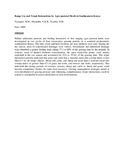| dc.description.abstract | Habitat utilization patterns and feeding interaction of free ranging agropastoral herds were investigated
in two cycles of four consecutive grazing periods, in a semiarid environment, southeastern Kenya. The bites count and
herd locations per area methods were used. During the dry season, areas of concentrated drainage; river valleys,
bottomlands and ephemeral drainage ways absorbed a greater feeding load, taking 57.1 to 60% of the grazing time by
the animals. In contrast, areas of limited moisture concentration, the open sandy/clay plains, were mainly exploited
in the wet season and accounted for 52.6 to 55.6% of the grazing time. The trophic interaction patterns indicated
that goats and cattle had a seasonal mean diet overlap index of less than 0.5 for all forage classes. Sheep and cattle,
and sheep and goats had a seasonal mean diet overlap index of greater than 0.5 on grass and forbs, and browse and
forbs, respectively. This indicated that during periods of resource scarcity, sheep and cattle or sheep and goats could
become competitive feeders for same feed resources. Grazing management strategies aimed at even distribution of
grazing pressure and enhancing complementary trophic interactions could be central to sustainable livestock production
in such environments. | en |

